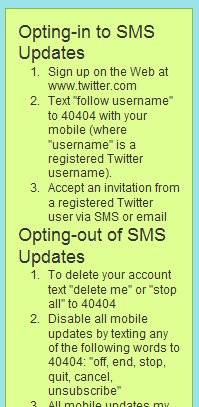How does Twitter not make money?

I confess I've not paid much attention to Twitter. As far as I'm concerned, the notion of mini-blogging dates back to the first day that Dave Winer started posting one-liners to Scripting News, which must have been well into the last century. Twitter's only innovation has been to limit the post length to 140 characters and make it something you can do from a mobile phone or by instant messaging rather than merely from a browser. I'm sorry, but like fellow ZDNet bloggger Andrew Keen, I'm too long in the tooth to get excited about thumbing pithy remarks into the ether, let alone the prospect of having to read a constant stream of the same from friends and acquaintances.
My interest was piqued, however, by today's TechCrunch report on Web services coming to Twitter. Apparently, a tweak to the Twitter API will make it possible to set up a Twitter account that allows an automated service to respond to queries such as "d weather 14202" with an appropriate answer — in this example, the weather forecast for zipcode 14202. It's pretty obvious that this has enormous potential, since similar services are already available via mobile phone networks, which any startup could now undercut by using the Twitter service, as TechCrunch's writer explained:
"Currently, it costs a lot of money to launch a start-up in the SMS/mobile space — you have to license a shortcode monthly ($500-$1000/mo), pay a SMS gateway provider, and then pay anywhere from $0.03 - $0.05 per inbound or outbound text message. It adds up. But now, if a start-up chooses to use Twitter as a command line to their web service, it's free (until Twitter starts charging for it)."
Twitter's own 40404 SMS address is itself a shortcode, for which Twitter presumably pays up to a $1000 per month plus a few cents per message. The new API tweak allows Twitter to piggyback any number of separate direct response services within its own shortcode. That's a potentially very valuable service offering.
But it also set me wondering about Twitter's own business model, and how it has to be making a ton of money already (unless its founders really are clueless). Because none of those shortcode services are charitable concerns; they're all money-making ventures. They're premium-rate text destinations, for which users normally pay to receive a response. They make money because the service provider gets paid a cut of the charge your telco puts on your phone bill.
So this is what has me wondering how it can be that Twitter does not make money. Twitter's own service may be free, but sending and receiving Twitter messages via SMS most certainly is not, as several Twitter users have found to their cost (the most recent wave of converts have yet to see their bills — they may have a shock in store when they do):
Ethan Kaplan: "I got hit with a 60 dollars SMS bill last month because I was enamored with tracking and contributing to my friends talk about their dietary and travel habits. I turned off SMS alerts and now ... I don't use Twitter much."
Michael Parekh: "With the recent gush in Twitter messaging, my Twitter SMS message flow mushroomed from a handful a day to over a hundred per day. To my chagrin, I noticed, after calling and waiting for a Verizon Wireless customer service rep for over 20 minutes, that my usage had already cost me over $50 this month, vs. an average of $20 or so over the last couple of months."
Jason Calacanis: "Crushed by twitter bill... Ugh. Be careful people!"
I would be astonished if Twitter's owners haven't cut a deal to get a slice of all that SMS traffic. We are talking enormous revenues being generated by the phone companies. As Jason Devitt pointed out after watching Steve Jobs demonstrate iChat running on the iPhone, a 30 character message at 15c per message works out at a mind-boggling Five Thousand Dollars per Megabyte (hat-tip to Foneshow's Erik Schwartz). The normal business model is that providers pay a fee for the incoming message but recoup that cost with a slice of what subscribers pay to receive outgoing messages. If that's the case, then Twitter is already making huge profits since most messages posted to the site have multiple subscribers.

Many users have already been shocked by the unexpected costs of their new pastime. That shock will turn to anger if they discover Twitter has directly profited from those charges. And I don't see how, if Twitter's founders have as much as an iota of commercial sense or understanding of the industry in which they operate, it is possible that they cannot be profiting.
But it is of course a Web 2.0 company, so anything is possible I suppose. Perhaps Twitter's founders really have stumbled upon a huge money-making machine without ever realizing how to switch on the revenue flows (more evidence emerges today that this actually is the case). There is, then, still scope for a happy ending: Twitter does the deal it should already have done with the networks, and at the same time comes clean with its user base about the likely cost of the SMS option, perhaps sweetened by some special discount deals for Twitter users with those same networks. Of course the networks could snatch defeat from the jaws of victory by closing Twitter down to protect their existing shortcode revenues from Twitter's API. But in my view they'd be foolish to cut off the far greater potential they could earn from letting Twitter flourish.
UPDATE: Twitter's founders have responded to this post. They don't take a cut.